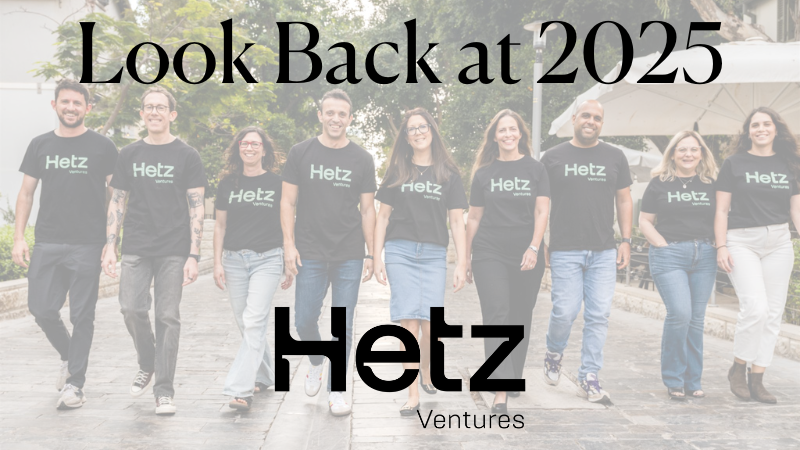"I was bothered by the lack of genuine and substantial engagement with the data sector in Israel."

Read/listen to the full episode with Guy [Hebrew]
Below is a translated transcript of the interview, originally appearing in Geektime and "Another Podcast for Startups" podcast.
Guy Fighel is a successful entrepreneur and a partner at Hetz Ventures where he leads the Data Program, and is considered one of the senior experts in the software industry in Israel with over 25 years of experience in global development domains. In 2016, he founded the startup SignifAI, where he served as co-founder and CTO until it was sold to New Relic. The company developed a platform for predicting and addressing faults that are discovered in the software development process and was sold within just three years of its establishment. Previous to Hetz, Fighel served as Senior Vice President and GM in the AI Engineering platform of New Relic.
Hetz Ventures is an Israeli venture capital firm managing nearly $300 million, focusing on seed investments in software companies, including DevOps, DevTools, open source, AI, Data, cybersecurity, and fintech. As a partner in the fund, Fighel leverages his entrepreneurial experience to support and accompany companies from the idea stage to advanced fundraising rounds.
What was the journey of starting the startup and selling it after three years?
"I established SignifAI in 2016 out of a painful problem I identified two years earlier while working as an employee in California. The company had large traffic and scale, and I was responsible there for the DevOps. There were many tools trying to help me understand the uptime in production, but it was important for me to know why things happen so I could identify them in advance. It may sound trivial today, but at the time it was very difficult. I started looking for ways to solve this problem, read articles about NASA's shuttles and their use of expert systems, and realized that similar things could be done in DevOps and monitoring systems. That was the first journey that led to the establishment of SignifAI. We worked three super crazy and hard years, established the company while the development center was in Israel and I was living in the United States. We raised money from American funds, and after three years, we received several offers from various parties, one of which was New Relic, and we decided that selling to them was the right thing for us."
What led to your decision to move from the world of entrepreneurship to the investment field?
"On one hand, as someone who has been through it several times, I know how hard the entrepreneurial journey is and how much energy is needed to succeed. On the other hand, it's very hard for me to work in enterprise. I stayed at New Relic for four years only because I really enjoyed the professional world, and I had an empowering work environment that allowed me to do crazy things. I see my journey in the investment world as one who can really connect and understand the direction of entrepreneurs. Incidentally, I also sit in a fund that can help with the financial aspect, but that's not the main thing. I want to help in places where I myself failed or didn't receive enough help, and to shorten the path for entrepreneurs."
You lead a program in the fund that deals with data, where does your affinity for the field come from?
"In my opinion, in the end, everything converges and is driven by data. In recent years, the field has experienced significant boom due to our growing volumes of data usage, consumption and storage costs, and naturally the issue of extracting insights using Machine Learning and AI. I was bothered by the lack of genuine and substantial engagement with the data sector in Israel. I asked myself why this wasn't happening, whether because the investments and the hype were going to cyber, or because potential entrepreneurs preferred to operate in their comfort zone from their service in a technological military unit? I talked with quite a few people and understood that the funds in the country simply lack sufficient understanding of the data field, lack knowledge of the existing technologies in the market, recent research, and an understanding of the potential customer personas. Because an ecosystem around the field has not been created here, a lot of knowledge and skill is missing.
In practice, despite the market being in recession, all companies are adopting data platforms today in every business unit because you can't do without it. I call this The New Modern Data Stack, it's a huge market with huge opportunities starting from where the data is located and how it's imported, through transformation to modeling, predictions, storage, and turning insights into business practices. We all need information all the time to understand where sales are going, to identify areas of abandonment, to understand what works and what doesn't in real-time, and to influence the outcomes. Companies today have no option to do this without relevant information coming from internal and external sources."
What can entrepreneurs interested in data receive in the Hetz program?
"Our data program, nicknamed SPARQL, encourages innovation and accompanies entrepreneurs in the initial ideation stages up to establishing a company in the data field. The process begins with a conversation with the entrepreneurs and rolling ideas together for several weeks alongside initial validations and examining the dynamics between us. Our goal is to identify areas where there are data gaps that can be solved, alongside a strong market need and feasibility at the technological infrastructure level. Hetz can lead the investment or join and help bring additional investors from the country and abroad. We have a professional partner network with experts and Chief Data Officers from leading global companies, including Twilio, Meta, Snowflake, and more."
What does an average process in the program look like?
"The process varies between two weeks to three months, depending heavily on the maturity of the entrepreneurs and the idea they come with. We start with a quick validation blitz to understand whether we want to continue in this direction or not. The cycle consists of bi-weekly sprints where we move in iterations, after each iteration we collect feedback and understand how and if to continue. There were times when very ripe opportunities came to us and it was very clear to us that we are entering an investment, and there were also quite a few times when the entrepreneurs came to us too raw or did not suit us and we chose to help them enter the market through acquaintances with other funds.
Our program is quite unique in the aspect of the global network that we offer entrepreneurs from the data field. Hetz also invests in companies outside of Israel, and that's not a standard model in the Israeli ecosystem. I see this as a force multiplier for entrepreneurs who have not yet joined us. Think of a second-time entrepreneur in Seattle who established and managed a company, sold it, and today it's a portfolio company of Hetz and he can talk with an Israeli entrepreneur from a different angle. Entrepreneurs who want to make a transition to the United States can also benefit from this network of contacts."
What tips or rules do you especially recommend to entrepreneurs at the start of their journey?
"I often see things that are less talked about in the industry, like entrepreneurs who don't fit each other. I identify it relatively quickly and many companies fall due to dynamics between partners. Entrepreneurs start working together and sort of 'date', and they may understand that their connection is not perfect but assume it will be fine and set out on the journey, and that can be a big mistake. In such cases, I recommend being very clear in coordinating expectations before setting out on the road, and if possible to work together for a sufficient period first; then of course it's preferable.
Another thing that recurs quite often is entrepreneurs who assume they know how to do something better than others, giving themselves validation that they have a feature that another product doesn't have or that they went and talked to 10 companies and all of them pointed to the same need. That's not strong enough, entrepreneurs need to check in-depth and not be afraid to do a real drill-down to really understand whether their solution offers a dramatic value that no other company is able to provide."


.jpg)